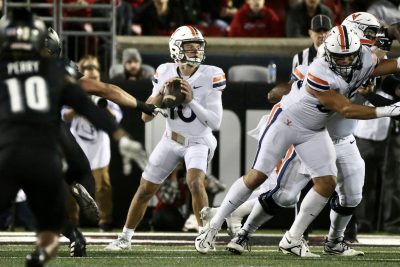After coming close at Louisville, Cavaliers need to learn how to FINISH
By Jerry Ratcliffe
If Tony Elliott had his way, he would print up T-shirts, hire a sign company to produce a giant banner for Virginia’s locker room and practice areas, and heck, while he’s at it, maybe hire one of those sky-writing planes to fly overhead during practice with one simple message: FINISH.
Virginia’s football team is those six letters away from being a bowl-eligible squad. Yes, there’s a lack of depth. No, recruiting hasn’t been that great the past few years. Sure, there have been injuries and all sorts of mistakes made — many self-inflicted — as this team has attempted to grow. All that considered, the Cavaliers are so close, they can taste it.
That’s what learning to win is all about, and UVA is close, so close. In fact, that’s what separated No. 11 Louisville and Virginia on Thursday night out in the Kentucky blue grass.
Louisville — more established, more talented, more depth — knew how to win. UVA is still learning.
“We’ve got to take that next step of finishing games,” Elliott said after his team dropped to 2-8 on the season. “At the end of the game, [Louisville] made two more big plays than we did.”
Virginia is 1-5 this season in games decided by one score, including Thursday night’s 31-24 loss, even though the freshman-led Cavaliers offense put up 434 yards against Louisville’s No. 12 defense (No. 2 in the ACC).
The difference Thursday night was that Louisville knew how to finish and Virginia still was riding on training wheels. Down 21-14 going into the fourth quarter, Louisville scored on its next three possessions, while holding UVA to a field goal.
Louisville coach Jeff Brohm commented that knowing how to win, finishing, is one of the major reasons his team is 9-1 with all sorts of possibilities remaining this season.
“I’m proud of our guys to hang in there when things were not going our way and play to the end, and finding a way to make enough big plays to win the game and get some stops at the end,” Brohm said. “You know, that’s really how football works. You go back and you try to learn from it, but when you play good teams, you’ve got to just find a way to make one more play than they do and score one more point than they do.”
Brohm had nothing but respect for Virginia, pointing out early in the game week how the Cavaliers had beaten North Carolina on the road and took Miami to overtime on the road, so while he tried to warn his team, perhaps the Cardinals weren’t listening and were more focused on next week’s showdown with Miami.
“We’ve had some close games that we easily could have lost, could be sitting here not near in a great position that we are, but we found a way to win,” Brohm said.
Virginia’s defense delivered a strong performance except for the two big plays that turned the game around for Louisville. After a bad game in the lopsided loss to Georgia Tech — the Cavaliers gave up 305 yards rushing to the Yellow Jackets — Elliott complained his team’s tackling was shoddy.
Defensive coordinator John Rudzinski was clearly embarrassed by that weak showing and promised to fix things. He did.
Virginia did a great job against Louisville’s running game for the most part, basically shutting down the Cardinals’ inside-zone runs and also doing a good job of mixing up the pass coverage, which gave Louisville quarterback Jack Plummer fits in trying to figure things out.
He was confused at times and not as accurate as a result, giving up an interception return for a touchdown to UVA’s fabulous freshman linebacker Kam Robinson.
But in the fourth quarter, Louisville outscored the Cavaliers, 17-3. The Cardinals also outgained Virginia (187 yards to 113) during that span, with two explosive plays making the difference.
“It came down to too many big plays … we’d like to have those two plays back,” Rudzinski said afterward.
He was referring to a 52-yard pass play from Plummer to Ahmari Huggins-Bruce for a touchdown and the game-winning, 73-yard run by Isaac Guerendo, who carried the bulk of the rushing attack for hobbled starter Jawhar Jordan, the ACC’s second-leading rusher.
Elliott challenged his team at halftime and they responded. True freshman quarterback Anthony Colandrea took a giant step in his maturation process, was more poised under pressure and didn’t force things as much as he had in the past.
The Cavaliers have shown they can play with the upper half of the ACC. They just have to learn how to finish.
This week against Duke would be a good time to start.









